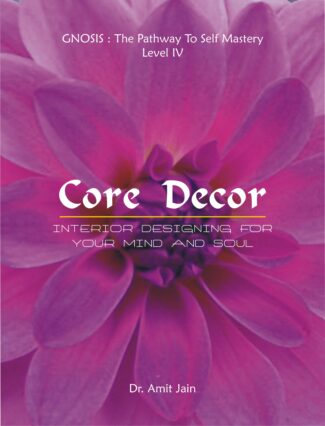
The book is a call for developing values of the soul rather than the moral values one has grown with. It provides a deeper understanding of the psychology of human behaviour and talks about three kinds of love sexual, emotional and conscious. It also reveals the esoteric exercises of Runes to awaken our consciousness.
Overall the book calls the reader to develop the values of the soul which are much more important than the moral values we have grown with. Also get a deeper psychological understanding on why some people annoy us so much and why we find some people very irritating and how we unconsciously project our own defects on others. Liberating and insightful, it talks about the three kinds of love Þ sexual, emotional and conscious. Dr Jain also reveals the esoteric exercises of Runes that awaken the consciousness.
For those striving to grow spiritually it explains in detail the Eightfold Path that is the most important teaching of Lord Buddha. Included here is wisdom for young on how to choose a vocation that each human being is here for a purpose. A must read for anyone on the path of spiritual awakening.
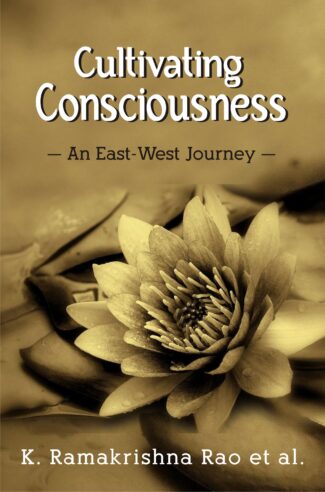
This book contains transdisciplinary discussions on the nature of consciousness, the methods of studying it, the relevance of consciousness to our values and its role in enhancing human potentials and wellness. Chapters of Ramakrishna Rao, devoted to Yoga, Advaita and Buddhism and contrasts the Indian views with those in the West, make the book a unique collection
Consciousness is the distinctive and defining future of human condition. Its study is at once fascinating and frustrating, because consciousness is too familiar to ignore and too complex and elusive to understand and explain. Many consider understanding consciousness the greatest challenge facing twenty-first-century science.
Cultivating Consciousness is an absorbing East West dialogue on the conceptual, methodical and theoretical issues. In this unique collection of scholarly articles by eminent researchers in and exponents of consciousness studies we find transdisciplinary discussions on the nature of consciousness, the methods of studying it, the relevance of consciousness to our values and its role in enhancing human potentials and wellness. Ramakrishna Rao discusses consciousness from the perspective of classical Indian thought in separate chapters devoted to Yoga, Advaita and Buddhism, and contrasts the Indian views with those in the West.
Over all, the book gives the nature of things to come, the controversies and complexities involved and the imminent clash of paradigms. This volume is more than a study in contrast; it is an intellectual bridge that facilitates the travel and exchange between the spiritual and scientific traditions of East and West and between first-person and third-person perspectives.
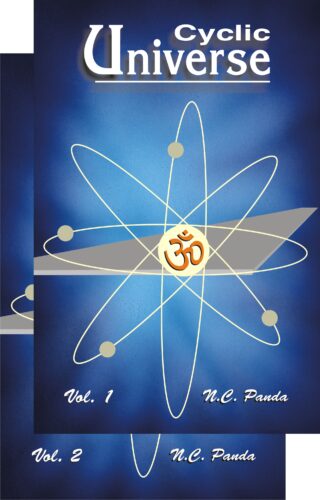
Professor Pandas insightful analyses corroborate the Vedantic world-view of the cyclic phenomenon of the origin, sustenance and dissolution of the universe, arguing that the universe has been created, it has a creator, and the expanding universe will contract by a reverse process to be finally dissolved in the power of Brahman.
Has the universe a beginning? Was it created? Who, then, is its creator? Or, alternately, is the universe uncreated? Is it beginningless and endless, with, of course, continual changes? Synthesizing the cumulative knowledge of science, philosophy, and religion: Eastern and Western, including Vedic/Vedàntic metaphysics, Professor Panda’s Cyclic Universe looks afresh at these mind boggling questions Þ which, ever since the dawn of human civilization, have evaded a convincing answer. In coming to grips with the issues around the evolution of the universe: the grand cosmos, the author examines not only the whole range of creation theories: both religious and philosophical, but also the Big Bang, its rival theories and modified versions, together with all the recent advances in anthropology, astrophysics, cosmology, Darwinism, molecular, biology, genetics, embryology, morphogenesis, neurobiology, and even computer science. Concludingly showing that the universe has been created, it has a creator, and the presently expanding universe will contract by a reverse process to be finally dissolved in the power of Brahman, Professor Panda’s insightful analyses corroborate the Vedàntic worldview of the cyclic phenomenon of the origin, sustenance and dissolution of the universe. Offering an original, well-integrated thesis on the baffling cosmic evolution, the book is bound to fascinate scholars and discerning readers alike.
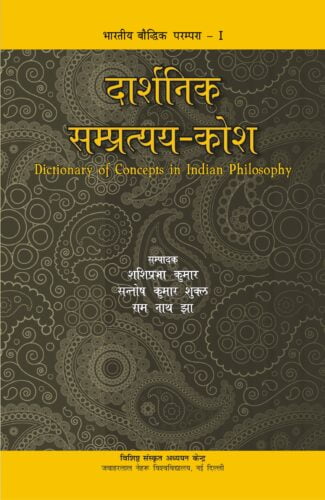
The present volume consists of a classical interpretation of important Indian philosophical concepts based on the original sources of each system thereof. Two hundred technical terms have been selected from significant schools/branches of Indian philosophy such as Veda, Mimamsa, Upanishads, Vedanta, Yoga, Samkhya, Vaisheshika, Nyaya, Jaina and Buddhism.
This encyclopaedic dictionary is one of its own kind in the sense that it is for the first time that a selection of original Indian philosophical concepts is done and the concepts are then explained by eminent scholars as per the Sanskrit texts of each school. There is no doubt that the dictionary will be useful for one and all: the inquisitive readers, researchers as well as the scholars of Indian Philosophy.
The present volume consists of a classical interpretation of important Indian philosophical concepts based on the original sources of each system thereof. Two hundred technical terms have been selected from significant schools/branches of Indian philosophy such as Veda, Mimamsa, Upanishads, Vedanta, Yoga, Samkhya, Vaisheshika, Nyaya, Jaina and Buddhism.
This encyclopaedic dictionary is one of its own kind in the sense that it is for the first time that a selection of original Indian philosophical concepts is done and the concepts are then explained by eminent scholars as per the Sanskrit texts of each school. There is no doubt that the dictionary will be useful for one and all: the inquisitive readers, researchers as well as the scholars of Indian Philosophy.
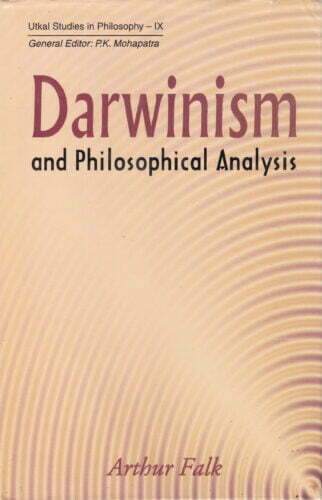
The work makes use of Darwinian insights to reveal that philosophical method can yield greater understanding of selfhood, consciousness of time and the nature of relation of thought to language. It presents a philosophy that is within the naturalistic tradition as represented by W. V. O. Quinn and which is vigorously defended against its competitor the Kantian tradition.
Has the universe a beginning? Was it created? Who, then, is its creator? Or, alternately, is the universe uncreated? Is it beginningless and endless, with, of course, continual changes? Synthesizing the cumulative knowledge of science, philosophy, and relegion: Eastern and Western, including Vedic/Vedantic metaphysics, Professor Pandas Cyclic Universe looks afresh at these mind boggling questions which, ever since the dawn of human civilization, have evaded a convincing answer. In coming to grips with the issues around the evolution of the universe: the grand cosmos, the author examines not only the whole range of creation theories: both religious and philosophical, but also the Big Bang, its rival theories and modified versions, together with all the recent advances in anthropology, astrophysics, cosmoslogy, Darwinism, molecular, biology, genetics, embryology, morphogenesis, neurobiology, and even computer science. Concludingly showing that the universe has been created, it has a creator, and the presently expanding universe will contract by a reverse process to be finally dissolved in the power of Brahman, Professor Pandas insightful analyses corroborate the Vedantic worldview of the cyclic phenomenon of the origin, sustenance and dissolution of the Universe. Offering an original, well-integrated thesis on the baffling cosmic evolution, the book is bound to fascinate scholars and discerning readers alike.
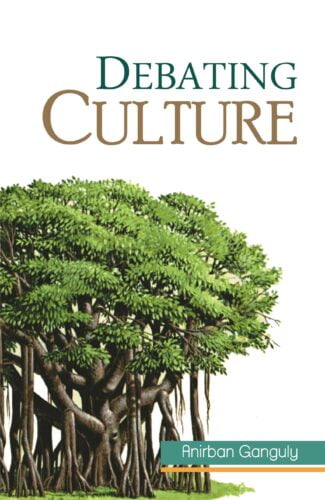
This book talks about the vision of our cultural thought-leaders like Ananda Coomaraswamy, Sri Aurobindo, Swami Vivekananda, Sister Nivedita, John Woodroffe, Syamaprasad Mookerjee and K.M. Munshi in making India a culturally strong nation. They remind us of our unique past and time-tested virtues and values, and the criticality of sustaining them while being modern in many ways
Barring the political agenda, the vital forces associated with India’s nationalist movement were moral, literary and artistic. Many cultural protagonists were vocal in saying that the regeneration of our society could happen through the revival of our arts and culture, not by politics and economics alone. This impulse was quite visible in cultural thought-leaders like Ananda Coomaraswamy, Sri Aurobindo, Swami Vivekananda, Sister Nivedita, John Woodroffe, Syamaprasad Mookerjee, K.M. Munshi and Jawaharlal Nehru. Rabindranath Tagore made a strong case for developing a complete and moving orb of Indian culture.
This book delves deep into the vision of these thought-leaders in making India a culturally strong nation, and warns us in different ways against becoming insularly modern. These personalities remind us of our unique past and time-tested virtues and values, and the criticality of sustaining them while being modern in many ways. They exult in our past and call upon us to be the torch-bearers of this legacy.
This volume, while doing an in-depth study of these Indian cultural activists, laments on the lackadaisical attitude of the leaders of Independent India in maintaining and promoting our art forms and long-revered culture. A renewed effort in rejuvenating our culture is the need of the hour, especially when its moorings seem to be loosening and its symbols diluting. It is an irony to call for the recognition of Indian culture in India!

This book discusses the manner in which Wittgenstein and Husserl pursued the concept of descriptive philosophy in their own philosophical set-up. It analyses the hazards arising in the way of faithful description and with the idea of faithful description itself.
Husserl and Wittgenstein broke off from the traditional attitude towards philosophy; they presented no ideologies, systems or theories but aspired to describe what one sees. In the present book, Dr. Krishna Jain discusses the manner in which they pursued the concept of descriptive philosophy in their own philosophical set up and also analyses the hazards which inevitably arise in the way of faithful description and with the idea of faithful description itself.
Jain, Bauddha and Ajivaka belong to Sramanic tradition. Ajivakas were firm believers of determinism (Niyativada). Determinism, in philosophy, implies that all events, including moral choices, are completely determined by previously existing causes. But when we talk about niyati as per Jain perspectives, there is a doctrine of karma. According to karma theory, an individual’s present condition is determined not by any absolute principle but by his own actions performed either in his past lives or in this life. By freely choosing the right course and following it faithfully, he could improve his destiny and ultimately win salvation.
But Jainism does not totally reject the doctrine of Niyativada. It talks of five co-factors (panca-samavaya), i.e. kala, svabhava, niyati, purvakrta and purusa. The first cause of the universe is false when each of the five factors is taken singly but true when they are considered jointly. Buddhist text Digha Nikaya talks of two types: (1) Theistic determinism (2) Karmic determinism. However, Buddha does not teach that we have complete freedom or that we are determined, but that our will is conditioned or limited to a greater or lesser extent.
This volume contains ten selected papers that present the philosophical discussion on determinism in Srmananic traditions, particularly in Jainism.
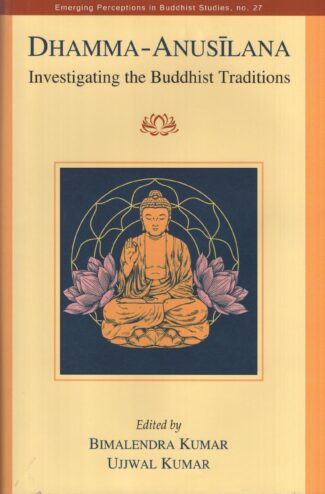
This book is an anthology of seventeen cerebral articles from well-known Buddhist scholars associated with major universities across the globe deliberating many a topic associated with Buddhist religion and its philosophies as part of our constant striving to understand the fundamental nature of what the Buddha wanted us to realize.
There have been serious attempts to understand the Buddha and his teachings since the inception of Buddhism some 2,600 years ago. All through the history of Buddhism, scholars were constantly striving to understand the fundamental nature of what the Buddha wanted us to realize. This book is an anthology of seventeen cerebral articles from well-known Buddhist scholars associated with major universities across the globe. In four parts – Meditation; Personality and Position; Dharmakirti and Persons; and Principles, History and Grammar – it highlights some pertinent topics associated with Buddhism and its legacy.
Part I discusses the diverse dimensions of meditation, dedicating itself to the kiriya (action) aspects of Buddhism. Part II is an attempt to delineate and study the major branches of Buddhism. Part III deliberates on the contributions of Dharmakirti and Rahula Sankrtyayana to the Buddhist philosophy along with the concept manusa-panatipata and how the revelation of reality of human experience by analysis helps a person to achieve wisdom in the light of Majjhima Nikaya Anathapindikovadasutta. Part IV has papers on different philosophical and applied concepts of Buddhism.
This volume thus should benefit one in understanding many an aspect of Buddhism vis-à-vis its enormous corpus of literature and teachings. It should highly benefit the students of Buddhism and for those who are keen to fathom deep into the myriad topics of Buddhist philosophy and teachings.
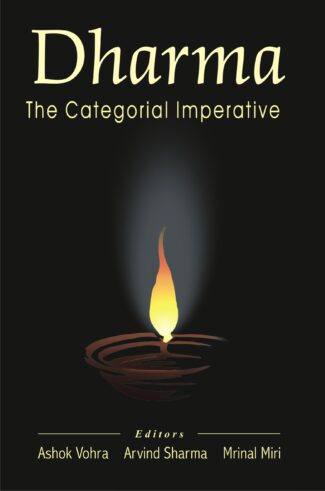
This book presents an in-depth study of the concept of dharma and acknowledges that Indian reality encompasses the elements of religion and dharma. It explores an alternative understanding of Indian civilization, independent of Western presuppositions as well as some contemporary issues relating to women and the dilemmas faced by the Indian diaspora.
Each stable culture and major civilization of the world consists of a distinct material base and a distinct ideational structure and has an inherent mechanism of striking its own equilibrium between the two. In the Indian tradition dharma is the balancing force. Religion and ideology are literally treated as synonymous with the Sanskrit word dharma. But dharma differs from religion in not being exclusive, and from ideology in possessing a transcendental dimension. The papers in this volume acknowledge that neither the word religion nor dharma can be discarded while looking at the Indian reality. They address themselves to the question: To what extent does the continued use of the concept of religion in the Indian context reflect reality, and to what extent does it distort or misrepresent its dhàrmic reality? Given India’s historical and the present existential situation these papers explore the question: Is an alterative understanding of Indian civilization possible, independent of Western presuppositions? The articles in the book present an in-depth study of the concept of dharma and its relation to the other purusharthas artha, kama and moksha, as well as with society, science, religion, Ayurveda and secularism. Relying mainly on the Vedas, epics, Manusmriti and the writings of Plato, Vivekananda, Gandhi et al., these papers explore some contemporary issues relating to women (stri-dharma) and the dilemmas faced by the Indian diaspora, especially in the UK and the US. These discussions have an appeal for a general reader as well as for scholars of Philosophy, Religion, Women’s Studies, Modern India and Sociology.